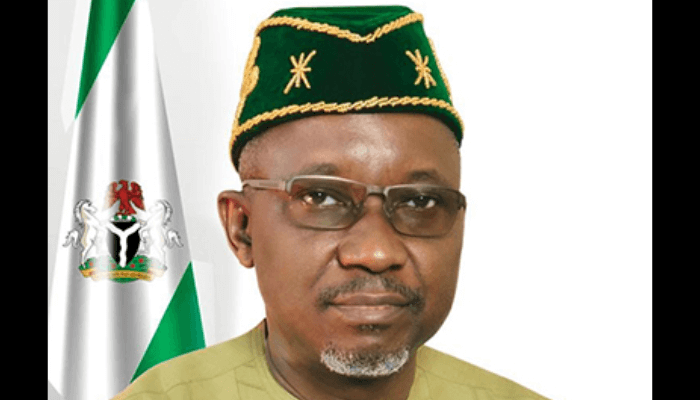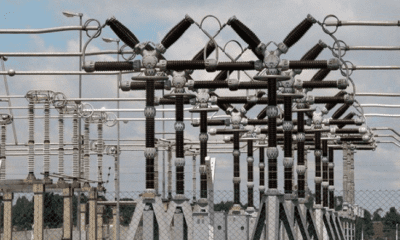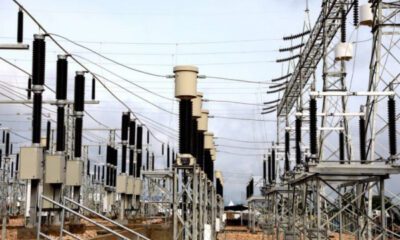Energy
NERC threatens DisCos with sanctions for rejecting power
The Nigerian Electricity Regulatory Commission has expressed concern over the electricity load rejection by power distribution companies despite the blackout witnessed in many parts of Nigeria.
It threatened to enforce appropriate regulatory actions against DisCos that fail to meet the key performance targets for electricity offtake, stressing that the disparity between available power capacity and customer demand was becoming large.
The power sector regulator in its latest quarterly report for Q3 2023 analysed by our correspondent on Friday, stated that the Partial Activation of Contract regime, which took effect in July 2022, defined the target volume of energy to be off-taken by Discos at any time as their Partially Contracted Capacity.
It explained that under the PAC regime, Discos had take-or-pay obligations on their PCC, meaning that they must pay for available power capacity irrespective of their offtake.
It said this structure was consistent with international best practices for long-term contract-based power procurement and ensures that power generation companies earn capacity payments to compensate them for availability.
“Considering the large disparity between available capacity and customer demand, it is expected that Discos will offtake their Partially Contracted Capacity at all times provided that the generation is available.
“However, the commission continues to observe with concern that many DisCos do not take their full PCC due to a combination of technical limitations as well as load rejection by the Discos largely due to commercial reasons, i.e., high losses in certain areas,” the NERC stated.
It, however, stated that to curtail this practice, the commission included load offtake as a key metric in its KPI Order — Order on Performance Monitoring Framework (NERC/316-326/2022), which was issued to Discos effective October 2022.
“The order provides that persistent load non-offtake to certain thresholds may trigger regulatory actions against the management of erring DisCos.
“Furthermore, it is noteworthy that when DisCos have offtake ratios below 100 percent, this means that they incur increased wholesale energy costs as they still have to pay NBET/Gencos for unused capacity for which they have no avenue to recover revenues,” the commission stated.
Further analysis of the report showed that in 2023/Q3, the average energy offtake by Discos at their trading points was 3,253.83 megawatts-hour/hour, which represented an increase of +0.08 percent (+2.52MWh/h) when compared to 3,251.31MWh/h off-take in 2023/Q2.
But the commission pointed out that during the quarter, all the DisCos took less than their available PCC, except Eko and Ibadan DisCos which recorded offtake performance of 112.25 percent and 105.55 percent, respectively, and would therefore benefit from reduced wholesale energy costs.
The commission stated that it would utilise its Order on Performance Monitoring Framework “to enforce appropriate regulatory actions against Discos that fail to meet the KPI targets for offtake ratio.”
It added that “the situation room set up by the commission will continue to undertake a daily analysis of the energy offtake performance of DisCos and intervene with the management of DisCos as required.”
Power consumer groups have repeatedly kicked against the load rejection by DisCos, as they wondered why this had continued amid the poor supply of electricity across the country.
“Many Nigerians lack power supply, yet we still hear of electricity load rejection by Discos, what an irony that should be stopped,” the National Secretary, Nigeria Electricity Consumer Advocacy Network, Uket Obonga said.
He urged the commission to enforce all disciplinary sanctions that would make the power distributors live up to expectations in the supply of electricity to end users nationwide.
Meanwhile, the NERC explained that the Partial Activation of Contract regime also mandates GenCos or the Transmission Company of Nigeria to compensate DisCos through Liquidated Damages in the event of capacity shortfalls.
According to the regulator, under the single-buyer model being operated in the power sector, when there is a shortfall in generation, LDs from GenCos are treated as net-offs in the invoices issued to NBET thereby reducing the net payables due from DisCos.
Energy
We need consultation, public hearing to review PIA regulations – NMDPRA


The Nigerian Midstream and Downstream Petroleum Regulation Authority (NMDPRA) says consultation with stakeholders and public hearing must be conducted to review proposed draft regulations of the Petroleum Industry Act (PIA).
The Authority’s Chief Executive, NMDPRA, Mr Farouk Ahmed, said this on Tuesday in Abuja at its stakeholder’s forum on Midstream Petroleum Host Community Development Trust (MPHCDT) regulation.
Ahmed, represented by Mr Ogbugo Ukoha, Executive Director, Distribution Systems, Storage and Retailing Infrastructure, NMDPRA, said consultation was necessary to provide a platform for harnessing ideas for the HCDT implementation.
“The regulation shall apply only to the Midstream Petroleum Host Communities and a holder of a license that is engaged in the midstream petroleum operation in accordance with Section 318 of the PIA.
“This is a platform for us to deliberate and get feedback on the draft regulations that we publish,” he said.
In an overview, Dr Joseph Tolorunse, the Authority’s Secretary and Legal Adviser, said the NMDPRA may by notice designate the facilities to which these regulations shall apply in accordance with the PIA.
He listed the objectives of the regulations to include the procedure for the establishment and administration of the Trust Fund for the midstream petroleum host communities and to establish parameters to safeguard the Trust Fund.
According to him, the regulation would also establish grievance resolution mechanism for the settlement of disputes between the host communities and licensees.
“The regulation will make general rules for the implementation of the development of the midstream petroleum host communities. It is expected to promote social and economic benefits from petroleum operations to the host communities.
“It will enhance peaceful and harmonious co-existence between the licensees, lessees and the host communities, as well as curtail pipeline vandalism and increase oil production,” he said.
Also speaking, Chairman, House Committee on Host Communities, Dounamene Dekor, said the committee had carried out a series of engagements to understand the current status of implementation of benefits to host communities.
He urged the Authority to expedite action to apply proactive and innovative mechanisms that would ensure the speedy and effective operationalisation of funding of host communities in the sector.
“We have noted some of the challenges that the authorities face in the implementation of the PIA, particularly the omission of the mainstream petroleum operations in Section 240-2 that provides for the funding of HCPs.
“Our committee is ready and already taking necessary legislative steps to address these gaps and challenges,” he assured.
Energy
Ekpo highlights pivotal role of LPG in industrialisation, job creation


Minister of State Petroleum Resources (Gas), Rt. Hon. Ekperikpe Ekpo, has emphasised the strategic importance of investment in the gas sector, saying it was pivotal for driving industrialization, job creation and improvement of the livelihood of the generality of Nigerians.
The Minister stated this at the groundbreaking ceremony of Windek Energy Limited 20,000 Metric Tonnes (MT) Liquefied Petroleum Gas (LPG) depot project at Atabrikang, Aquaha in Ibeno Local Government Area, Akwa Ibom State at the weekend.
He lauded the vision and commitment of Windek Energy Limited in Nigeria’s journey towards energy security and economic prosperity.
A statement by the Spokesman to the Minister, Louis Ibah, which quoted Ekpo, said the project would boost ongoing efforts in ensuring affordable supply of LPG, commonly known as cooking gas, to Nigerians.
“This project marks a significant milestone in Nigeria’s journey towards energy security and economic prosperity. It will enhance access to clean and affordable cooking fuel,” the Minister said.
Ekpo thanked the Akwa Ibom State government for providing the enabling environment for investments to thrive.
He underscored the fact that the establishment of the LPG depot was a testament to the fruitful collaboration between the public and private sectors in the state.
The Gas Minister said the LPG depot project holds immense promises, not only for Akwa Ibom people, but for the entire nation.
Akwa Ibom State Governor, Pastor Umo Eno, in his speech thanked the Minister of State Petroleum Resources Gas, Ekperikpe Ekpo, for facilitating the establishment of the gas plant in the state.
Eno, represented by the Deputy Governor, Senator Akon Eyakenyi, also assured Ekpo and the management of Windek Energy Limited of the security of contractors and staff, as well as the support and collaboration of the host community in bringing the project to fruition.
MD/CEO, Windek Energy Limited, Mrs. Nosa Okunbor, said the project holds the prospect of stimulating economic growth, fostering innovation, and facilitating the emergence of new industries and value chains within Akwa Ibom State.
“This project is not just about enhancing energy infrastructure, but about enhancing life such that our mothers will cook without hazards to their health,” she said.
Energy
Nigeria to produce 4,000 metric tonnes of lithium per day – Shettima


Nigeria is poised to produce 4,000 tonnes of lithium per day, Vice-President Kashim Shettima, said on Monday in Abuja.
Declaring open a two-day roundtable on Sustainable Development of Nigeria’s Mining Sector, Shettima said President Bola Tinubu would soon inaugurate Nigeria‘s largest lithium factory capable of processing 4,000 metric tonnes of lithium per day.
He noted that the Minister of Solid Minerals Development, Dr Dele Alake performed a ground-breaking ceremony for the Lithium factory in Nasarawa in 2023 to produce 18,000 metric tonnes of lithium per day.
Shettima said that more lithium sites were being discovered across the country.
Lithium is a soft, silvery-white alkali metal. It is the least dense solid element and is a critical solid mineral in the global energy transition.
It is currently mined in Nasarawa, Kogi, Kwara, Ekiti and Cross River states.
The vice-president commended Alake for the reforms he had brought to the solid minerals sector particularly his plan to sanitise and reposition the sector to boost Nigeria’s economic profile.
He also commended the Minister for making the sector public and private sectors-driven, adding that the approach would open up the sector for opportunities and fast-track its development.
Shettima was represented at the roundtable by Nasarawa’s Gov. Abdullahi Sule,
Speaking at the event, Alake said the ministry’s seven-point agenda was in line with President Tinubu’s commitment to diversify Nigeria’s economy.
He said that one of the ministry’s critical seven-point agenda was the emphasis placed on local value addition through policies that promoted the processing of raw minerals because of the economic multiplier effects.
He thanked the National Institute for Policy and Strategic Studies (NIPSS) Kuru, near Jos, for organising the summit.
Alake said the development of the solid minerals sector required collective responsibility by all stakeholders to make it a key contributor to the national economy.
He noted that the roundtable would enrich the analysis of the sector and its recommendations would guide the Executive arm of government in decision-making.
“NIPSS deserves commendation for prioritising the mining sector and in appreciating the strategic value the president placed on diversifying the nation’s economy,” he said.
Alake said also that a dual-pronged approach, combining coercive and persuasive methods, was employed to combat illegal mining and to attract foreign direct investment to the sector.
He explained that the persuasive measure entailed formalising artisanal and illegal miners into cooperatives and that 150 of such cooperatives had been registered so far.
The minister said the coercive method involved the establishment of a Mining Marshal Corps deployed across the country to secure mining environments.
He stressed the importance of geoscience data in providing investors with information on the location and quantity of minerals, among others, to help them to “de-risk” investments.
Alake said that a preliminary survey by a German company revealed an estimated 750 billion dollars’ worth of solid minerals in the belly of Nigeria.
Earlier, the Director-General of NIPSS, Prof. Ayo Omotayo, said the roundtable aimed at charting a way forward to deliver a diversified economy and to formulate policies to advance the mining sector.
NIPPS organised the roundtable in collaboration with a consulting firm.
-
capital market2 years ago
Rt.briscoe, FBNH, Others halts negative performance of stock market
-
Finance3 months ago
Court orders Sen. Victor Umeh to repay N136m bank debt to AMCON
-



 Abuja Update2 months ago
Abuja Update2 months agoUNDP, FG partnership needed to achieve inclusion, equity- Minister
-
Abuja Update1 month ago
Banks drive stock market performance with N147bn gain
-



 Business1 week ago
Business1 week agoTingo Group unveils Tingo Electric, Tingo Cola drink at Lagos launch
-



 Health2 weeks ago
Health2 weeks agoCapacity training will reduce migration of health workers- NPHCDA
-
News4 months ago
Oil thieves sponsoring malicious media campaign against Navy – Spokesman
-



 Infotech1 month ago
Infotech1 month agoWorld Backup Day: NITDA urges Nigerians to ensure backup of data












